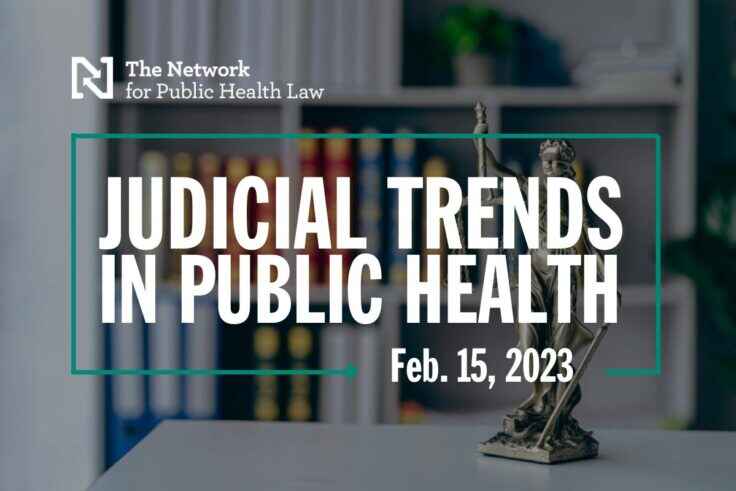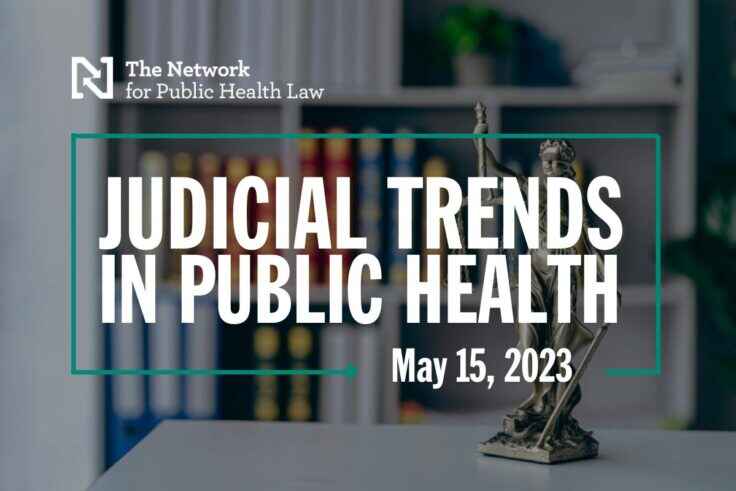|
The Network for Public Health Law monitors key court cases and relevant judicial trends in public health. The Network’s monthly reporter, Judicial Trends in Public Health (JTPH), highlights select published cases from the prior 3 months in public health law and policy. These cases are organized below by name, issuing court, date of issuance, along with a brief synopsis, link to the case abstract, and hyperlink to the full decisions (when publicly available). For more information, including a topic digest of these and other cases, see below. Questions, comments, thoughts? Contact the Network for more information. State of New York, et al. v. U.S. Department of Homeland Security (U.S. District Court for the Southern District of New York, Oct. 11, 2019): The federal district court ordered a nationwide preliminary injunction blocking the implementation of the Department of Homeland Security’s (DHS) revised public charge rule, previously set to go into effect on October 15, 2019. Read the abstract and access the decision here. Nicopure Labs v. U.S. Food & Drug Administration (FDA) (U.S. Court of Appeals for the Federal Circuit, Dec. 10, 2019): The Federal Circuit Court of Appeals upheld FDA’s deeming rule, which brought under FDA regulation all tobacco products, including electronic cigarettes (vapes). Read the abstract and access the decision here. RPF Oil Company v. Genesee County (Michigan Court of Appeals, Dec. 3, 2019): The Michigan Court of Appeals held that the state’s Age of Majority law, establishing that an individual age 18 is entitled to all rights, privileges, and responsibilities not otherwise excluded by statute or the constitution, preempted localities from prohibiting the sale of tobacco products to those under the age of 21. Read the abstract and access the decision here. EMW Women’s Surgical Center, P.S.C. v. Meier (U.S. Supreme Court denial of certiorari, Dec. 9, 2019): The U.S. Supreme Court denied EMW Women’s Surgical Center’s petition for certiorari, leaving in place Kentucky’s Ultrasound Informed Consent Act, which requires physicians to: (1) show a prospective abortion patient an ultrasound of her fetus; (2) describe the fetus in detail prior to providing an abortion; and (3) make the fetal heartbeat audible for the patient. Read the abstract and access the decision here. City of Boise v. Martin (U.S. Supreme Court denial of certiorari, Dec.16, 2019): The U.S. Supreme Court denied the City of Boise’s petition for certiorari on whether the enforcement of generally applicable laws regulating public camping and sleeping constitutes cruel and unusual punishment via the Eighth Amendment. Read the abstract and access the decision here. Safer Chemicals et al. v. U.S. Environmental Protection Agency (EPA), et al. (U.S. Court of Appeals for the Ninth Circuit, Nov. 14, 2019): The court concluded that under the Toxic Substance Control Act (TSCA), EPA must consider the outdated uses of a chemical (legacy activities) when evaluating the health and environmental risks of chemical substances. Read the abstract and access the decision here. Grafilo v. Soorani (California Court of Appeals, Second Appellate District, Oct. 2, 2019): The California Court of Appeals affirmed a trial court’s order compelling a psychiatrist to produce 6 patient medical records to the state medical board as part of its investigation into whether he was overprescribing controlled substances. Read the abstract and access the decision here. Turtle Island Foods SPC d/b/a/ Tofurky Co. v. Soman (U.S. District Court, Eastern District of Arkansas, Dec. 11, 2019): The district court granted Tofurky’s request to block several provisions of an Arkansas law banning the misbranding or misrepresentation of agricultural products by prohibiting marketing of such products under the name of another food. Read the abstract and access the decision here. Willis et al. v. City of Seattle, et al. (U.S. Court of Appeals for the Ninth Circuit, Nov. 29, 2019): The Ninth Circuit affirmed a district court’s order denying class certification for individuals seeking to challenge the City of Seattle’s and Washington State’s written policies for removing unauthorized encampments. Read the abstract and access the decision here. In re Upstream Addicks and Barker (Texas) Flood-Control Reservoirs (U.S. Court of Federal Claims, Dec. 17, 2019): The Court of Federal Claims found the U.S. Army Corps of Engineers liable for damages to properties flooded during Hurricane Harvey. Read the abstract and access the decision here. TOPICS: These and other cases are organized on the Network website under the topics below (adapted from chapter titles in Public Health Law in a Nutshell (3rd Edition) by James G. Hodge, Jr., Director, Network for Public Health Law—Western Region). Select a topic below to view all cases under that topic. 1. Source & Scope of Public Health Legal Powers 2. Constitutional Rights & the Public's Health 3. Preventing & Treating Communicable Conditions 5. Addressing Chronic Conditions 6. Mitigating the Incidence & Severity of Injuries & Other Harms 7. Public Health Information Management, Privacy & Security JTPH is made possible through a collaboration of the Network’s Western and Eastern Region Offices led and edited by April Shaw, JD, PhD, Staff Attorney, at the Western Region Office. Additional contributors include: James G. Hodge, Jr., JD, LLM, Kathi Hoke, JD, Leila Barraza, JD, MPH, Kerri McGowan Lowrey, JD, MPH, Mathew R. Swinburne, JD, Megan Griest, MPP, Cecilia Nieto, and Emily Carey.
|




